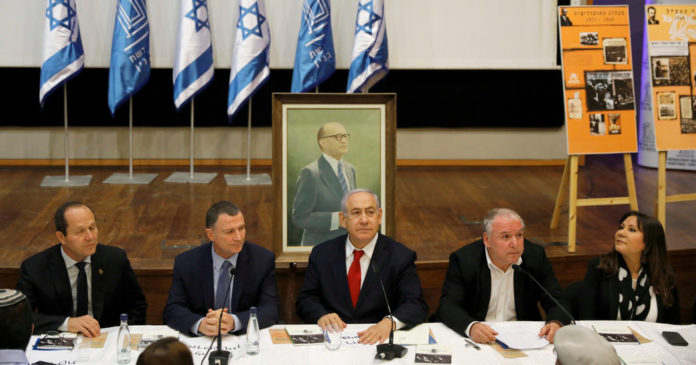In life, he was a fiery orator and campaigner who upended nearly three decades of political domination by Israel’s socialist founders and their Labor Party.
Now, 27 years after his death, Menachem Begin — the militant Zionist, the founder of the right-wing Likud party and the storied prime minister — has re-emerged as an unlikely icon as Israelis prepare to go to the polls on April 9.
With an apparent dearth of living visionaries, Mr. Begin’s legacy as both peacemaker with Egypt and bellicose champion of Greater Israel have turned him into a versatile, if posthumous, campaign prop.
Selectively appropriating pieces of his mantle, parties from the right, left and center are declaring themselves as his ideological progeny — or invoking his humility and commitment to democratic principles to show how far today’s Likud has strayed.
“Now everyone is claiming they are Begin,” said Herzl Makov, president of the Menachem Begin Heritage Center, the official national memorial in Jerusalem.
“On the right side of the map, they are trying to show they are following in the path of Begin, and on the left they want to goad the right and show they are not his true heirs,” said Mr. Makov, a former chief of staff to Mr. Begin’s successor, Yitzhak Shamir.
Likud’s current leader, Prime Minister Benjamin Netanyahu, is running for a fifth term even as he faces corruption charges. On Monday, a Likud campaign ad ridiculing a report about a fake, pro-Likud Twitter network included an audio recording of Mr. Begin. Last month Likud held a meeting at the Begin Heritage Center to commemorate the anniversary of his death.
Mr. Netanyahu’s opponents are also busy making use of his name.
Benny Gantz, a centrist and former military chief who is posing the most serious challenge to Mr. Netanyahu in a decade, sniped in a Facebook post that Mr. Begin would have kicked Mr. Netanyahu out of his Likud. Conversely, Mr. Gantz wrote, Mr. Begin would not have been welcome in Mr. Netanyahu’s Likud, where “he would have been considered an enemy of Israel.”
Moshe Kahlon, the leader of a small, center-right party who defected from Likud, appears on billboards across the country with a ghostly image of Mr. Begin looming over his right shoulder.
Most surprisingly, Mr. Begin has starred in a campaign video of the far-left Meretz party. It opens with archival footage of him passionately debating the peace with Egypt in Parliament and declaiming: “Indeed there are sacrifices for peace, indeed there are. They are all preferable to the sacrifices of war.”
Release of the clip coincided with the 40th anniversary of the March 26, 1979, signing of the historic Israeli-Egyptian peace treaty by Mr. Begin and Anwar Sadat.
“This is an example of two bold leaders who acted courageously to change the reality,” said Tamar Zandberg, the leader of Meretz, in an interview. “Just this week of the 40th anniversary we nearly had war break out with Gaza,” she said, referring to the latest in a series of cross-border flare-ups.
“Meretz’s cry is to avoid a war of choice, with more wounded and more dead,” Ms. Zandberg said, adding that the repeating Gaza wars had left the sides where they began.
While the campaign ad stirred much interest, she said, some people also found it jarring.
As leader of the underground Irgun paramilitary group that operated before Israel’s 1948 founding, Mr. Begin presided over the deadly bombing of the King David Hotel in Jerusalem in 1946, in which more than 90 people were killed, including British Mandate employees, Arab and Jewish hotel staff members and bystanders.
In his six years as prime minister, from 1977 to 1983, Mr. Begin achieved peace with Egypt by withdrawing from the Sinai Peninsula. But he also vastly expanded Jewish settlements in the occupied West Bank in a bid to secure a Greater Israel and preclude Palestinian independence. The 1982 war he waged to flush the Palestine Liberation Organization out of Lebanon was widely criticized as Israel’s first “war of choice,” rather than of last resort, and it took Israel 18 years to extricate itself.
“For sure,” Ms. Zandberg acknowledged, “Begin did not turn into a leader of Meretz.”
A man of contradictions, the Polish-born Mr. Begin was a nationalist firebrand who also subscribed to the European tradition of liberalism, which translated in the Israeli context into the aspiration for an equally Jewish and democratic state. In his time he was as deeply loved as he was loathed.
A stickler for the rule of law, he respected the judges in Jerusalem and the rights of Israel’s Arab minority, and was a paragon of modesty. By contrast, Mr. Netanyahu is running a divisive campaign against Israel’s Arab citizens, has tried to undermine the law enforcement authorities driving the corruption cases against him and his government has tried to curb the powers of the Supreme Court.
Old-style liberals like Mr. Begin’s son, Zeev Binyamin Begin, known as Benny, are a dying breed in the Likud party. Benny Begin, who was first elected to Parliament in 1988 and who declined to be interviewed for this article, decided not to run this time around.
“The truth is now it is democratic versus Jewish, one against the other,” said Mr. Makov of the Begin Heritage Center, arguing that the right is more interested in the Jewish part while the left places democracy first.
“We need to recreate that harmony,” he said.
Many of the issues for which Mr. Begin advocated are still relevant. He rode to power in 1977 in part by harnessing the resentment of Israel’s social underdogs, the Mizrahi Jews who hailed from North African and the Middle Eastern countries, and he gave them a political voice after decades of discrimination at the hands of the Ashkenazi elite of European descent.
During the 1981 election campaign, after a celebrity supporting the Labor party came out with an anti-Mizrahi slur, Mr. Begin famously invoked the heroism of two former comrades in the underground who came from Iraqi and Ashkenazi stock, declaring before a roaring crowd, “Ashkenazim? Iraqis? Jews! Brothers! Warriors!”
Many critics were reminded of that unifying moment after Mr. Netanyahu and six of his top Likud lieutenants took a selfie outside the Begin Heritage Center last month. All of those in the photo were Ashkenazi men. Miri Regev, a prominent Likud minister of Moroccan descent, was excluded from the photo.
Avi Gabbay, the Labor Party leader who was also born to Moroccan immigrants, accused the party of racism.
By coincidence, a documentary series called “The Times of Begin” is currently showing on Kan Television, Israel’s public broadcast station; the program captures the complexities of a leader who stirred such passion and, now, such nostalgia.
In a review of the series, Chen Artzi Sror, a columnist for Yediot Aharonot, wrote that “complexity is perceived as weakness” in this election campaign. Israelis, she wrote, want leaders with a worldview “that can be formulated in a Twitter post, preferably with exclamation marks.”
“‘The Times of Begin,’” she wrote, “provides not only a look back at history, but also to the future that we perhaps want to formulate together, anew.”
Source : Nytimes














